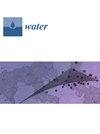使用 GIS-DEMATEL 方法进行城市洪水风险评估和绘图:波兰塞拉法河流域案例
IF 3
3区 环境科学与生态学
Q2 ENVIRONMENTAL SCIENCES
引用次数: 0
摘要
本文开发了一种将地理信息系统(GIS)和决策试验与评估实验室(DEMATEL)相结合的方法,用于分析影响城市洪水风险的因素和识别洪水易发区。该方法基于九个选定因素:土地利用/土地覆盖(LULC:建筑区比例、绿化区比例)、海拔、坡度、人口密度、与河流的距离、土壤、地形湿度指数(TWI)和归一化植被指数(NDVI)。DEMATEL 方法用于确定选定因素之间的因果关系,从而确定关键标准及其权重。LULC 和人口密度被确定为城市洪水最重要的风险因素。该方法被应用于一个案例研究--塞拉法河流域(波兰),这是一个城市化集水区,覆盖了克拉科夫和维利奇卡两个城市的住宅区,经常受到洪水的影响。该流域是一个城市化集水区,覆盖了克拉科夫和维利奇卡两个城市的住宅区,经常受到洪水的影响。总流域面积的 45% 被归类为洪水风险非常高或高的地区。研究结果与该地区近年来发生的淹没事件的实际数据相吻合。这项研究表明,使用 DEMATEL-GIS 方法来确定各种因素的重要性并划定洪水易发区具有潜力和可能性。本文章由计算机程序翻译,如有差异,请以英文原文为准。
Urban Flood Risk Assessment and Mapping Using GIS-DEMATEL Method: Case of the Serafa River Watershed, Poland
This paper develops a method integrating Geographic Information Systems (GIS) and the Decision-Making Trials and Evaluation Laboratory (DEMATEL) for the analysis of factors influencing urban flood risk and the identification of flood-prone areas. The method is based on nine selected factors: land use/land cover (LULC: the ratio of built-up areas, the ratio of greenery areas), elevation, slope, population density, distance from the river, soil, Topographic Wetness Index (TWI), and Normalized Difference Vegetation Index (NDVI). The DEMATEL method is used to determine the cause–effect relationship between selected factors, allowing for key criteria and their weights to be determined. LULC and population density were identified as the most important risk factors for urban floods. The method was applied to a case study—the Serafa River watershed (Poland), an urbanized catchment covering housing estates of cities of Kraków and Wieliczka frequently affected by flooding. GIS analysis based on publicly available data using QGIS with weights obtained from DEMATEL identified the vulnerable areas. 45% of the total catchment area was classified as areas with a very high or high level of flood risk. The results match the actual data on inundation incidents that occurred in recent years in this area. The study shows the potential and possibility of using the DEMATEL-GIS method to determine the significance of factors and to designate flood-prone areas.
求助全文
通过发布文献求助,成功后即可免费获取论文全文。
去求助
来源期刊

Water
WATER RESOURCES-
CiteScore
5.80
自引率
14.70%
发文量
3491
审稿时长
19.85 days
期刊介绍:
Water (ISSN 2073-4441) is an international and cross-disciplinary scholarly journal covering all aspects of water including water science and technology, and the hydrology, ecology and management of water resources. It publishes regular research papers, critical reviews and short communications, and there is no restriction on the length of the papers. Our aim is to encourage scientists to publish their experimental and theoretical research in as much detail as possible. Full experimental and/or methodical details must be provided for research articles. Computed data or files regarding the full details of the experimental procedure, if unable to be published in a normal way, can be deposited as supplementary material.
 求助内容:
求助内容: 应助结果提醒方式:
应助结果提醒方式:


